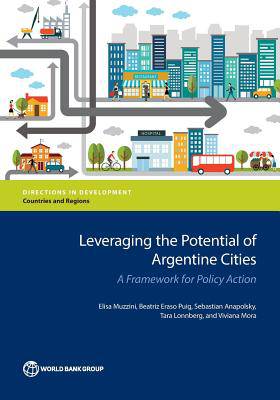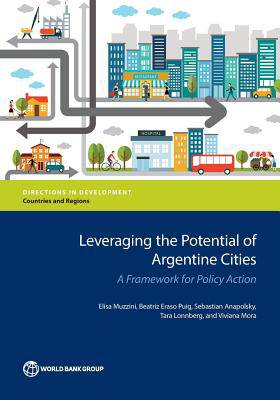
- Retrait gratuit dans votre magasin Club
- 7.000.000 titres dans notre catalogue
- Payer en toute sécurité
- Toujours un magasin près de chez vous
- Retrait gratuit dans votre magasin Club
- 7.000.0000 titres dans notre catalogue
- Payer en toute sécurité
- Toujours un magasin près de chez vous
Leveraging the Potential of Argentine Cities
A Framework for Policy Action
Elisa Muzzini, Beatriz Eraso Puig, Sebastian AnapolskyDescription
Argentina s path to economic prosperity is through efficient, sustainable and economically thriving cities. Not only are cities a spatial concentration of people, but also they generate agglomeration economies by concentrating ideas, talent, and knowledge. Argentina is one of the most urbanized countries in Latin America, with 90 percent of Argentine people currently living in cities. Argentina s cities are geographically and economically diverse, and its largest urban area Metropolitan Buenos Aires is one of Latin America s urban giants. Argentine cities need to address three main challenges to leverage their economic potential. Argentina s current patterns of urban development are characterized by (a) high primacy and unbalanced regional development, (b) limited global economic footprint of urban economies, with employment concentrated in nontradable and resource intensive sectors, and (c) unplanned low-density urban expansion. Argentine cities thus face the challenges of moving toward a more balanced regional development, transitioning from local to global cities, and from urban sprawl to articulated densities to take full advantage of the benefits of agglomeration economies. To address these challenges, Argentina needs the leadership of the federal government; the coordinating power of provinces; and the capacity of empowered, financially sound municipalities. Argentine cities also need system-wide policy reforms in areas such as territorial planning, municipal finance, housing, urban transport, and local economic development. Leveraging the Potential of Argentine Cities: A Framework for Policy Action aims to deepen our empirical understanding of the interplay between urbanization and agglomeration economies in Argentina by asking the following: (a) What are the main trends and spatial patterns of Argentina s urbanization that underlie agglomeration economies?, (b) Are urban policies leveraging or undermining the benefits of agglomeration economies?, and (c) Are Argentine cities fully reaping the benefits of agglomeration economies to deliver improvements in prosperity and livability? By addressing such questions and exploring their implications for action, this study provides a conceptual framework, empirical data, and strategic directions for leveraging the potential of Argentine cities."
Spécifications
Parties prenantes
- Auteur(s) :
- Editeur:
Contenu
- Nombre de pages :
- 474
- Langue:
- Anglais
- Collection :
Caractéristiques
- EAN:
- 9781464808401
- Date de parution :
- 16-12-16
- Format:
- Livre broché
- Format numérique:
- Trade paperback (VS)
- Dimensions :
- 178 mm x 254 mm
- Poids :
- 784 g

Les avis
Nous publions uniquement les avis qui respectent les conditions requises. Consultez nos conditions pour les avis.






